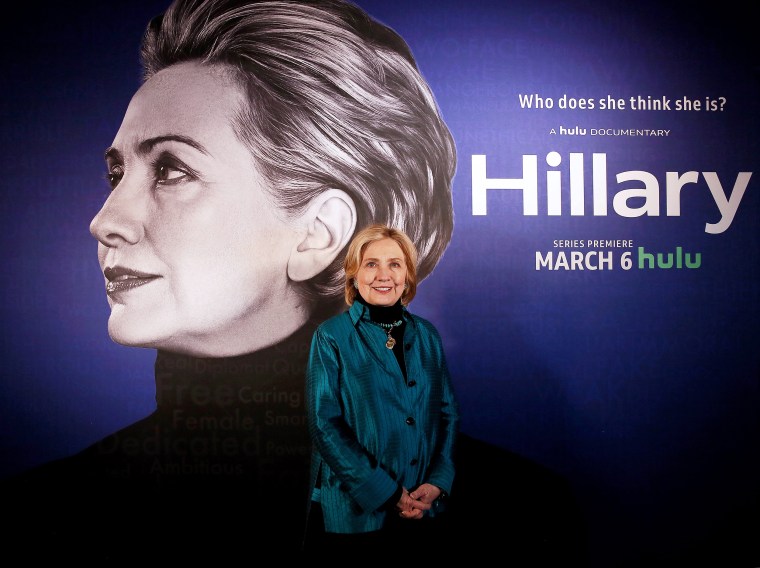DES MOINES, Iowa — It can't be fun for Hillary Clinton to be watching the 2020 election play out.
One of her former foes, Bernie Sanders, is surging in Iowa ahead of Monday's caucuses, while her other foe, Donald Trump, is now president and held a massive rally here Thursday night to promote his juggernaut re-election campaign.
A third old political rival, former President Barack Obama, whose victory over Clinton in the 2008 Democratic primary contest started in Iowa, is praised and revered almost daily in ads and speeches by the party's presidential candidates.
Her name is rarely mentioned. and when she does come up, it's often not in a good way.
But Clinton has still made her presence felt in this election.
"Wouldn't we like to run against her?" Trump asked Thursday night at his rally in Des Moines. "Who's tougher? Her, crazy Bernie, Biden, Buttigieg — who would be the closest?"
“I don't know, maybe we take another crack at crazy Hillary. Would that be OK?" he said to roars of approval.
Clinton seems up for a rematch, too — and not just with Trump.
Clinton has kept an iron in the Democratic primary fire, from last year allowing rumors to spread that she might make a late entry into race, to sharply criticizing Sanders and Rep. Tulsi Gabbard, D-Hawaii, to a media tour to promote a new documentary that happened to premiere at the Sundance Film Festival last weekend, days before the caucuses, which are set for Monday.
Clinton told Variety at Sundance that she certainly felt the urge to take on Trump again "because I feel the 2016 election was a really odd time and an odd outcome," before adding that she would work to support whoever wins the Democratic nomination.
The documentary, a four-part series based on 35 hours worth of interviews with Clinton, won’t go public until March 6 when it appears on Hulu, but it has already caused controversy because of her remarks about Sanders: "Nobody likes him. Nobody wants to work with him. He got nothing done. He was a career politician," Clinton said. "It was all just baloney, and I feel so bad that people got sucked into it."
Her remarks, in addition to inciting a small firestorm, created an odd role-reversal, with left-wing activists playing the scolding grown-ups and urging party unity and cooler rhetoric.
"In our collective fight against Donald Trump, we all have to be ready to support whoever the eventual Democratic nominee for president is," said Alexandra Rojas, the executive director of Justice Democrats. "Defeating Trump is far more important than settling old scores."
The other Democrats in the 2020 race wanted nothing to do with the controversy, declining to defend Clinton or Sanders.
"I didn't love going through the experience of our party divisions in the past," Pete Buttigieg told reporters in Mount Pleasant, Iowa, last week. "I'm focused now on making sure that the future is better."
"I'm not going there," Massachusetts Sen. Elizabeth Warren said when asked about it by CBS News.
Obama is a frequent touchstone among the candidates. His legacy, and whether it's being sufficiently respected, has been much debated.
Buttigieg has been not-so-subtly reminding Iowans that they gave a chance to "a young man with a funny name" 12 years ago when they picked Obama over Clinton in the 2008 caucuses, and he’s asking them to "make history" again by selecting him.
Biden, of course, mentions his former boss all the time — in ads, on the stump, in interviews and everywhere in between.
He doesn't talk about Clinton, though he has brought up a study by Harvard researchers that found that policy issues made up just 4 percent of media coverage of the 2016 campaign between Trump and Clinton. "Debating me, running with me, it's going to be 94 percent,” he said of policy issues in the race he hopes to run against Trump.
And when a voter in Iowa this month asked Biden if he was running a better campaign than Clinton, he gave a long answer before saying sexism hurt Clinton in 2016. "That’s not going to happen with me," he said.
Rep. Conor Lamb, who won a high-profile special election in a part of western Pennsylvania that voted for Trump and is now supporting Biden in the polls, wouldn’t criticize Clinton by name, but suggested Biden would play better in the Rust Belt than she did.
"There's a trust deficit. Folks used to vote for Democrats before. They still do at the local level," Lamb told NBC News. "But there’s something about national Democratic leaders that they haven’t liked in recent elections. And I think Vice President Biden reminds them of the Democratic Party of old."
In the final days before the caucuses, the women running this year have begun leaning into their gender and stressing the chance for voters to finally elect the first female president. But they don’t bring up Clinton or riff on the 66 million cracks she put in the proverbial glass ceiling — the number of votes she won against Trump, which was enough to win the popular vote but not the Electoral College.
While many Democratic voters here express admiration of Clinton, it's mixed with disappointment and even some hostility.
Karl Stoppel has caucused for pretty much everyone except Clinton: In 2008, he was for Biden, then Obama when he was forced to make a second choice, and in 2016 he went for Sanders. But after all that, he doesn't blame Clinton for losing to Trump.
"I think any Democrat would have gotten steamrolled by Donald Trump," he said.

